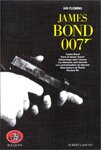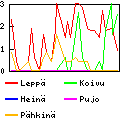Vendredi, 30 mars 2007
Traduction: [ Google | Babelfish ]
Catégories : [ Bière/Greene King ]
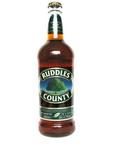
“Ruddles County is famed for its dry, bitter flavour, which comes from using
the rare Bramling Cross hops. Many liken the flavour to burnt toffee and
caramel… Ruddles County has a light aroma of soft fruits and hops, and is a
deep brown colour with warm, reddish tones.”
It actually smells a bit like burnt toffee, but I don't recognise fruits in the
taste. The aftertaste, however, is very bitter. Made of malted barley.
Ruddles Brewing, Bury St. Edmunds, Suffolk, England. 4.7% alcohol.
[ Posté le 30 mars 2007 à 19:29 |
pas de
commentaire |
lien permanent ]
Mardi, 27 mars 2007
Traduction: [ Google | Babelfish ]
Catégories : [ Informatique ]
I found a nerd test on Tinou's blog, so of course, I had to take it.
Looks like I'm quite a nerd…

[ Posté le 27 mars 2007 à 15:28 |
3
commentaires |
lien permanent ]
Traduction: [ Google | Babelfish ]
Catégories : [ Informatique ]
Damn, they had a geek test on the same page, so of course, I had to take it
too.

[ Posté le 27 mars 2007 à 15:28 |
1
commentaire |
lien permanent ]
Lundi, 26 mars 2007
Catégories : [ Blog ]
Wez Furlong suggests to use RBL to reject blog spam.
I submitted my collection of spam to Spamhaus's Zen service,
but only 40% of my spammer's IP addresses were recognized. Checking for the
existence of the URLs in these spams takes much more time,
since most of them don't exist anymore and you waste time waiting for DNS to
timeout. Testing with the last 40 ones didn't return any match, maybe they are
too recent to be already in the RBL.
[ Posté le 26 mars 2007 à 15:24 |
pas de
commentaire |
lien permanent ]
Samedi, 24 mars 2007
Catégories : [ Science | Thé ]
Stéphane, auteur du blog Teamasters, a
récemment acquis une théière en argent massif. Au vu de nombreuses personnes
dubitatives quant à l'intérêt réel d'une théière de ce type, il a étudié le
refroidissement de l'eau que l'on verse dans la théière, comparant argent,
terre cuite et porcelaine. J'ai tenté aujourd'hui de reproduire l'expérience.
Comme je n'ai pas de théière en argent (je ne suis pas encore fanatique à
ce point), j'ai utilisé un gobelet en argent massif, un gaiwan blanc en
porcelaine et un récipient gradué en inox. Les mesures sont faites sans
couvercle.
Conditions initiales
- température de la pièce (et donc des récipents) : 22 °C
- température de l'eau au sortir de la bouilloire : 98 °C
- volume d'eau : 1 dL
Résultats
Pour chaque récipient, on donne le matériau dans lequel il est fabriqué, la
masse du-dit récipient, la chaleur massique du matériau, puis la température
de l'eau au bout de 10 secondes, une minute et cinq minutes.
| Matériau | Masse | Chaleur massique | 10 s | 60 s | 300 s |
|---|
| Gaiwan | Porcelaine | 82 g | 1100 J/kg/K | 86 °C | 81 °C | 66 °C |
|---|
| Mesure | Inox | 62 g | 510 J/kg/K | 94 °C | 87 °C | 70 °C |
|---|
| Gobelet | Argent | 100 g | 240 J/kg/K | 91 °C | 86 °C | 72 °C |
|---|
Discussion
Le thermomètre utilisé refroidit assez vite, mais se réchauffe plus lentement.
Obtenir une mesure précise à 10 secondes est plutôt hasardeux s'il est plus
froid que l'eau que l'on verse. J'ai donc décidé de le réchauffer dans la
bouilloire (ce qui permet aussi de prendre la températude de l'eau
« bouillante »), de le transférer rapidement dans le récipient, puis de
verser l'eau par dessus. Par ailleurs, dix secondes est un laps de temps très
proche de celui nécessaire au versement de l'eau, donc l'instant zéro est plutôt
mal défini (sans compter que je n'ai que deux mains, donc tenir la bouilloire,
le thermomètre et lancer le chronomètre en même temps est difficile).
On voit cependant dans les chiffres que l'acier inoxydable semble être un
meilleur matériau que l'argent, mais la diffrérence importante de masse entre
les deux récipients rend la comparaison assez difficile, étant donné qu'il faut
aussi estimer la vitesse du transfert de chaleur entre l'eau et les différents
matériaux, qui dépend des matériaux et de la surface d'échange entre eux. De
plus, les récipients ayant des tailles différentes, il y a pour chacun une
partie qui n'est pas en contact avec l'eau, mais qui va aussi absorber de la
chaleur par conduction thermique, la vitesse d'absorption dépendant alors
entre autres de l'épaisseur de la paroi du récipient.
Cela dit, si la chaleur massique du matériau est effectivemnt la clé du problème
du refroidissement de l'eau dans la théière, alors une théière en or massif
serait encore mieux adaptée, puisque sa chaleur massique est environ moitié de
celle de l'argent. Elle serait en revanche extrêmement sensible aux chocs…
Sources
Chaleur massique: http://www.alyon.org/InfosTechniques/chimie/chaleur_massique_diverses_substances.html,
pedagogie.ac-toulouse.fr/biotech-sante-envir/STHE_Equipements_partie_1.pdf page 14.
[ Posté le 24 mars 2007 à 21:58 |
9
commentaires |
lien permanent ]
Traduction: [ Google | Babelfish ]
Catégories : [ Bière ]
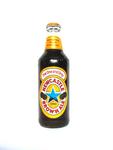
The first sip tastes like fresh bread. It has a sweet taste and the flavour
reminds me a little bit of beef broth. Made of malted barley, wheat and maize.
Newcastle Federation Breweries Ltd, Dunston, England.
[ Posté le 24 mars 2007 à 19:04 |
pas de
commentaire |
lien permanent ]
Jeudi, 22 mars 2007
Traduction: [ Google | Babelfish ]
Catégories : [ Râleries ]
In the kitchen next to my office, there is a giant flatscreen TV. Below it,
there is the TV's cardboard box, throwing to my unconsenting eyes cool new
technology acronyms such as 40 LCD, HD Ready, HDMI, Dolby Surround
and BBE Digital.
I wonder if other people are as offended as I am by the advertisement of
consumer-alienation technologies as above. Then I decided to design my own set
of cool acronyms to add to these devices. It could be something like
Enhanced EPC (Electrical Power Consumption), AO (Already Obsolete)
Ready, UYA (Up Your Ass) Connector, RCR (Restricted Consumer Rights)
Technology, PPP (Pay! Pay! Pay!) Enabled. I'm pretty sure I could sell
stuff bearing these.
Acronyms are so cool.
[ Posté le 22 mars 2007 à 12:50 |
2
commentaires |
lien permanent ]
Mercredi, 21 mars 2007
Catégories : [ Science ]

© Ultimate Ears
Après moultes péripéties avec le vendeur en ligne, j'ai fini par recevoir mes
nouveaux écouteurs. Contrairement aux précédents (Panasonic, livrés avec mon
vieux lecteur de CD portable) qui se plaçaient dans le pavillon de l'oreille,
ceux-ci se placent dans le conduit auditif, bloquant effectivement les sons
extérieurs. En revanche, tous les sons du corps se font remarquer : les
cervicales qui grincent quand je tourne la tête, un grattement de l'ongle sur
le nez, la respiration, les battemements du c½ur… Le port des écouteurs
n'est pas à proprement parler douloureux, mais il est bien plus intrusif que
les précédents et quelque peu gênant. Peut-être que cela disparaitra avec
l'usage ?
Du point de vue de la qualité sonore, les Super.fi 3 Studio sont sans commune
mesure avec les anciens écouteurs. Bien que certains leur reprochent un manque
de basse, ils ont un rendu des basses pourtant bien meilleur et semblent
reproduire les sons en général de manière plus précise. Je soupçonne cette
qualité accrue de provenir tant de la qualité du transducteur que de la
position dans l'oreille et l'isolation supplémentaire qu'elle apporte. Un
inconvénient cependant : positionner correctement l'écouteur dans l'oreille
s'avère difficile, surtout lorsqu'on a comme moi des conduits auditifs tordus,
et le positionnement a une influence sur le rendu sonore.
Enfin, le contenu du paquet ne correspond pas tout à fait à ce qui est annoncé
sur le site Web de Ultimate Ears et dans la notice : j'ai eu en cadeau bonus
un atténuateur (à utiliser dans l'avion, à en croire le petit logo dessiné
dessus) et une paire d'adaptateurs en silicone supplémentaire, à double rebord
(de toutes façons trop gros pour mes oreilles). Cadeau du marchand ou erreur
du fabriquant ? Je ne vais pas me plaindre :)
[ Posté le 21 mars 2007 à 00:00 |
pas de
commentaire |
lien permanent ]
Mardi, 20 mars 2007
Traduction: [ Google | Babelfish ]
Catégories : [ TV/Leffakone ]
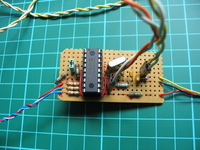 Thanks to Niko, my Leffakone project is finally
complete. He built the timer I designed already two and a half years ago, that
enables Leffakone to boot automatically when it is time to record a TV show.
Thanks to Niko, my Leffakone project is finally
complete. He built the timer I designed already two and a half years ago, that
enables Leffakone to boot automatically when it is time to record a TV show.
The device is based on a Microchip 16F84A PIC and is connected to the Wake On
LAN connector of the computer, as well as to the parallel port. The WOL
connector provides +5V to the device even when the computer is powered down.
The parallel port is used for sending the 24-bit timeout value to the timer,
one bit at a time (one line is data, another line is a “data available”
signal). The timer then ignores all input for three minutes, giving enough
time to shutdown the computer (when the computer shuts down, some garbage is
sent to the parallel port, which would be considered as input if it were not
ignoring it). After that delay, it counts down to zero, and then sends a
signal to the WOL connector that boots the computer. It's as simple as that.
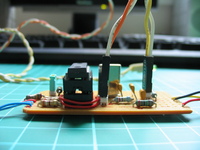 The device has two LEDs, one indicating that power is on, and one status LED.
The status LED is:
The device has two LEDs, one indicating that power is on, and one status LED.
The status LED is:
- On when the device is in standby, waiting for input.
- Off when the device has received partial input and waiting for more.
- Blinking at 0.25 Hz when ignoring all inputs.
- Blinking at 0.5 Hz when counting down.
When the timer is in the process of receiving input, and the procedure does
not complete, the internal watchdog timer makes it reboot after about two
seconds, putting the device back to standby mode.
The timer is supposed to accept timeout values in seconds, but the programming
contraints in the device are such that the actual time unit is worth about 1.02
seconds.
[ Posté le 20 mars 2007 à 23:31 |
pas de
commentaire |
lien permanent ]
Dimanche, 18 mars 2007
Traduction: [ Google | Babelfish ]
Catégories : [ TV ]
For years I've been especially following three TV series: Murder, She Wrote,
MacGyver, and Lois & Clarke: The New Adventures of Superman. All three of
them came to an end within a couple of weeks. The last episode of Murder, She
Wrote aired on February 28th, the last Lois & Clarke on March 3rd and
MacGyver March 17th. I feel empty, like I'd have lost several friends at
once, especially since I had been watching Murder, She Wrote assiduously for
over three years.
Thankfully, the wonderful world of television has brought relief to my pain
through the remarkable concept of rerun: Jessica Fletcher still shows up
regularly in my set from season eight, as do Lois, Clark and MacGyver, since
the two shows are broadcast again from the start! This allows me incidentally
to see the first six or seven episodes of Lois & Clarke which I missed last
time, and to re-record the episodes of MacGyver which are incomplete in my
collection.
[ Posté le 18 mars 2007 à 01:20 |
pas de
commentaire |
lien permanent ]
Vendredi, 16 mars 2007
Traduction: [ Google | Babelfish ]
Catégories : [ Bière/Belhaven ]
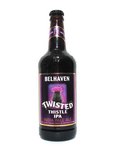
“The blend of Cascade and Challenger hops combine to produce a fresh hop
aroma that preludes a bitter-dry taste. Crafted from nearly three centuries of
brewing heritage at one of Scotland's oldest breweries.”
Just another ale, with a fresh taste, maybe slightly acid. Made of malted
barley.
Belhaven Brewery Company Ltd, Dunbar, Scotland. 5.5% alcohol.
[ Posté le 16 mars 2007 à 22:42 |
pas de
commentaire |
lien permanent ]
Jeudi, 15 mars 2007
Traduction: [ Google | Babelfish ]
Catégories : [ Bière/Ridgeway ]
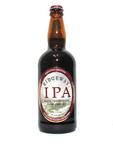
“Authentic IPA would have been a live beer… made with pale
malts … and unprocessed whole leaf hops with moderate bittering power but
pungent aromas of spice and resin.
Bottle conditioned beer is bottled with live yeast sediment and undergoes
further fermentation in the bottle.”
The taste is quite bitter, but also fruity. Made of malted barley.
Ridgeway Brewing, Oxon, England. 5.5% alcohol.
[ Posté le 15 mars 2007 à 19:17 |
pas de
commentaire |
lien permanent ]
Traduction: [ Google | Babelfish ]
Catégories : [ TV/Cinéma/James Bond ]

© MoviePoster.com
Bond recovered a large sum of money belonging to Sir Robert King, a personal
friend of “M”. When getting close to his money at MI6 headquarters, King gets
killed by an explosion; the bank notes have been covered with an explosive
triggered by King's lapel pin, which had been replaced by a fake. While
investigating about King, Bond notices that the money he retrieved is exactly
the sum that had been paid as a ransom to free King's daughter Elektra some
time ago. M had helped King to retrieve his daughter, but had refused to pay
the ransom, rather using the daughter as a bait. The kidnapper was Renard the
Anarchist, who took a bullet in the brain when MI6 was trying to kill him,
after Elektra managed to escape. The bullet is moving towards the center of
the brain, making him progressively loose his sense of touch and smell and
insensitive to pain. M sends Bond to protect Elektra. He meets her at a
pipeline construction site inherited from her father in Azerbaidjan but she
refuses his help, not trusting MI6 anymore. Bond later saves her life from an
attack; he also tears a piece of cloth bearing a russian marking from one
attacker. He then meets Valentin Zukowski, an acquaintance of his in his
casino in Baku. Zukowski recognizes the marking as that of an antiterrorist
unit of the Russian ministry of energy. He tells Bond that Elektra's pipeline
has several competitors who may be willing to get rid of her. Later, while
snooping around Elektra Bond notices that her chief of security is somehow
related to the former attackers. He follows him and takes his place at some
meeting with who were waiting for him. They trust him and take him to a
facility in Kazakhstan where nuclear weapon are being disabled and destroyed.
He meets there Dr. Christmas Jones, the nuclear scientist in charge of the
process and pretends to be a Russian scientist. Bond notices that Renard is
also working at the facility and is trying to steal plutonium. Renard manages
to escape with a nuclear head, blowing up everything, and Bond and Jones
barely escape themselves. Bond then suspects that Eletktra and Renard are
actually working together because of something they both said in different
occasions, but Elektra convices him otherwise. Elektra then lures M to Baku
and kidnapps her, while Bond is sent with Jones to investigate a possible
terrorist attack in the pipeline. Instead of defusing the bomb (which appears
not to be nuclear), he lets it explode in order to make Elektra believe that
he is dead. They then go meet Zukowsky again on the Caspian Sea, because Bond
made a connection between him and Elektra. Zukowsky admits providing her with
material with the help of a nephew of his who is the captain of a russian
submarine. He also tells Bond that they are currently in Istanbul, and takes
them there. They then discover that Renard has taken over the submarine and
plans to put the plutonium into its nuclear reactor in order to provoke a
meltdown that would look as an accident. This would destroy all the pipeline
of King's competitors. Bond and Jones get then caught by Renard because of
Zukowsky's assistant being an accomplice of him. Jones is taken to the
submarine while Bond is left with Elektra who tries to torture him, but he is
saved by Zukowsky who died just after. Bond kills Elektra and manages to enter
the submarine. There is then an big fight between Bond and Renard; Bond wins
and saves the world.
[ Posté le 15 mars 2007 à 01:27 |
pas de
commentaire |
lien permanent ]
Mercredi, 14 mars 2007
Traduction: [ Google | Babelfish ]
Catégories : [ Livres ]

© Amazon.fr
First volume of the Manifold trilogy, Time has been published in 2000 by
Stephen Baxter.
2010. Reid Malenfant, who had been rejected by NASA as an astronaut still
dreams to go into space. Since he cannot do it in the traditional way, he
decides to build his own space rockets using available technology in order to
go mining the asteroids. His ex-wife, Emma Stoney is still working for him as
a project manager. One day, Cornelius Taine approaches Malenfant and convices
him using a statistical theory that within two years a major catastrophe is
going to occur within the next two-hundred years, provoking the end of the
world. He is however convinced that if mankind has survived, it will try to
send a message back in time. Using a neutrino-based radiotransmission model
that allows waves to travel back in time, they manage to pick up a message
that directs them to one particular asteroid called Cruithne. Malenfant
decides to change his mission goal from an easy to reach, rich in metals
asteroid to Cruithne. The first mission sent there is manned by a genetically
enhanced squid and discovers the presence of a blue circle that transports the
probe traversing it to the future. They discover eventually that humanity has
survived, but that in the very far future, matter in the universe is decaying
and that mankind barely survives rather than lives. Meanwhile, prodigiously
intelligent and slightly autistic children have been born for several years
all over the world and seem to affectionate blue rings. Taine is convinced
that they are somehow linked to the ring found on Cruithne. While a manned
mission counting Malenfant, Stoney, Taine and one “blue child” called
Michael is sent to Cruithne just before being arrested by the authorities, the
blue children are being feared by the populations of Earth which view them as
a new race going to take over humanity in the future. A group of these
children, doing advanced research on fundamental physics manages however to
escape to the moon. Meanwhile, the party on Cruithne is stranded there after
being attacked by the descendant of the squid, which have taken over the
asteroid and prepare to migrate to the Trojans (a remote asteroid cluster).
Michael steps into the ring and disappears. Later, Military forces from Earth
(mainly trying to show that they still control something) attack Cruithne, but
all except one soldier are destroyed by the squids. Our heroes escape the
wrath of surviving soldier by stepping into the circle. They are transported
through parallel universes where the rules of physics are so different that
matter cannot necessarily exist, witnessing their Big-Bangs. Each time they
step again into the ring, they come a little bit closer to their original
universe. Taine then sends back in time the message that would lead them to
the exploration of Cruithne. Just after that, the soldier who has followed
them finds them and Taine gets killed trying to protect the other two,
providing them with the soldier's equipment and allowing them to survive a bit
longer. Malenfant and Stoney manage to finally come back to Cruithne, five
years after leaving, just in time for Emma to die. Malenfant, feeling
responsible for Emma's death because he forced her to come with him to
Cruithne, commits suicide while jumping into the circle. During those five
years, NASA has built a base on the Moon next to the one built by the blue
children, in an attempt to control what they are doing. Malenfant wakes up in
what appears to be a hotel room, and meets there Michael, explaining that his
conciousness has been transferred into the giant computer that allows humanity
to survive in the very far future. Michael tells him that he can change the
past, which he gladly accepts. In the new future, Emma is sent to the Moon to
negociate with the children who are building a doomsday machine that would
destroy the whole universe and recreate a new one. Their goal is to give a new
start to this universe, trying to prevent humanity to surviving in horrible
conditions in the far future. Floating in space far above the solar system,
Michael and him watch the expolsion on the Moon extend to Earth, to the solar
system, before being themselves anihilated by it.
This book is similar to 2001: A Space Odyssey in the sense that it starts like
a hard science novel but ends up in a psychedelic way. The end is quite
depressing (but the alternative predicted there is not really better).
[ Posté le 14 mars 2007 à 19:02 |
pas de
commentaire |
lien permanent ]
Lundi, 12 mars 2007
Catégories : [ Science ]

© Tara Expeditions
« Le voilier scientifique polaire Tara a commencé en septembre 2006, une
dérive arctique qui durera deux ans. La coque arrondie et plate de Tara lui
permet en effet de résister aux pressions extrêmes exercées par la banquise et
de se laisser porter par elle.
L'expédition, dirigée par Etienne Bourgois, s'inscrit dans le cadre de l'Année
Polaire Internationale (API) 2007-2008. Elle est un partenaire majeur du
programme européen scientifique DAMOCLES. Programme d'envergure qui réunit plus
de 45 laboratoires développant un système d'observations et de prévisions à
long terme de l'Océan Glacial Arctique. Ceci afin dévaluer et prédire les
risques et les impacts des changements climatiques sur notre environnement.
Au carrefour de la science, de la technologie, de la pédagogie et de la
communication, Tara Arctic est une grande aventure humaine qui a la volonté de
sensibiliser les citoyens de la planète sur l'importance des équilibres
écologiques. »
(source: Tara Expeditions)
Sur France Inter, ils n'arrêtent pas de parler de l'API, alors forcément j'ai
fini par en entendre parler aussi. Et puis, au détour d'une interview dans
l'émission du 3 mars de CO2, mon amour, j'ai appris que je suis encore plus
près du pôle que je le croyais
(86°14'41" aujourd'hui).
[ Posté le 12 mars 2007 à 15:20 |
pas de
commentaire |
lien permanent ]
Dimanche, 11 mars 2007
Traduction: [ Google | Babelfish ]
Catégories : [ Bière/Greene King ]
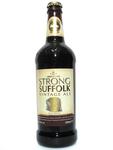
“A unique blend of two classic ales BPA and Old 5X. Old 5X is aged in oak for
2 years. Brewed in llimited quantities. This Vintage Ale is dark and intense,
almost ruby in colour with an appetising spicy, fruitcake aroma. This
full-bodied ale combines flavours of oak, caramel and burnt toffee… can also
be the ideal accompaniement to mature English cheese.”
Quite sweet and very slightly bitter. It tastes of candied fruits, maybe
raisins. The after taste of the first sip reminded me of well-done butter
biscuit, the next ones of caramel. The smell of the glass is however not very
pleasant, very metallic. I tried it with bits of Pilgrim's Choice
Matured Cheddar and the result is quite nice (although not extraordinary).
Greene King Westgate Brewery, Bury St Edmunds, Suffolk, England. 6.0% alcohol.
[ Posté le 11 mars 2007 à 19:07 |
pas de
commentaire |
lien permanent ]
Catégories : [ Blog ]
2006-07-25 11:24:57 -> 2007-03-11 14:03:25
Browsers
- MSIE: 4074 (62.7%)
- Firefox: 1855 (28.5%)
- Safari: 246 (3.8%)
- Mozilla: 154 (2.3%)
- Opera: 143 (2.2%)
- Konqueror: 20 (0.3%)
- Lynx: 8 (0.1%)
OS
- Windows: 5769 (88.8%)
- Mac OS: 382 (5.9%)
- Linux, *BSD: 260 (4.0%)
- ???: 89 (1.3%)
W3Schools statistics
[ Posté le 11 mars 2007 à 14:14 |
pas de
commentaire |
lien permanent ]
Catégories : [ Blog ]
[ Posté le 11 mars 2007 à 14:12 |
pas de
commentaire |
lien permanent ]
Samedi, 10 mars 2007
Traduction: [ Google | Babelfish ]
Catégories : [ Bière/FAVORITES | Bière/Wychwood ]
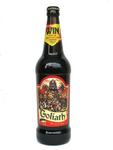
“Brewed with choice Styrian Golding hops…”
Quite sweet, it surprisingly tastes of flowers, maybe like violet. Made of
malted barley. The 660 mL bottle is quite big, its content doesn't fit into a
pint…
Wychwood Brewery Co., Whitney, Oxfordshire, England. 4.2% alcohol.
[ Posté le 10 mars 2007 à 18:39 |
pas de
commentaire |
lien permanent ]
Vendredi, 9 mars 2007
Catégories : [ Science ]
L'aspirateur nasal est un appareil qui permet de moucher un enfant qui n'a pas
encore appris à souffler par le nez. Les appareils les plus simples sont
constitués de deux tuyaux connectés à un réservoir. On place un tuyau dans le
nez de l'enfant et on aspire avec la bouche par l'autre. Pour éviter les
remontées de microbes vers la bouche sous forme d'aérosol, le tuyau
« bouche » est muni d'un filtre. Ce filtre absorble les liquides et finit
par se boucher, en particulier si un nettoyage malheureux sous le robinet le
noie… Ne reculant devant aucun sacrifice, et plutôt que d'acheter un nouvel
aspirateur, j'ai supprimé le filtre, ce qui augmentait le pouvoir aspirant de
l'appareil, mais laissait tous les microbes venir dans ma bouche. Voila ce
qui arrive quand on veut recycler du matériel prévu pour un usage unique
(enfin je suppose que c'est à usage unique).
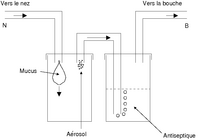
Ceci m'a conduit à concevoir un aspirateur nasal à filtre amovible, nettoyable
et remplaçable, pour un coût minime. Le montage schématisé ci-contre utilise
un second aspirateur qui jouera le rôle de filtre sous forme de flacon de
lavage. Le liquide peut être de l'eau, qui diluant l'aérosol diminuera la
probabilité qu'un microbe remonte vers la bouche. On peut imaginer utiliser un
antiseptique à la place de l'eau, tel du vinaigre, de l'alcool médical ou la
gnôle infecte qui traine depuis des années au fond du placard.
Donc un jour où j'aurai pas la flemme, j'irai à la pharmacie acheter un
deuxième aspirateur nasal et bricoler le biniou ci-dessus.
[ Posté le 9 mars 2007 à 23:11 |
pas de
commentaire |
lien permanent ]
Traduction: [ Google | Babelfish ]
Catégories : [ Bière ]
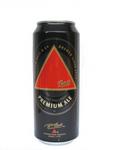
Just another ale, but with a slightly flowery smell, a smooth texture, as if
the gas bubbles were smaller, and a hint of sweetness. Made of malted barley.
Inbev UK Ltd, Luton, England. 4.4% alcohol.
[ Posté le 9 mars 2007 à 19:44 |
pas de
commentaire |
lien permanent ]
Samedi, 3 mars 2007
Catégories : [ Bière/Fuller's ]
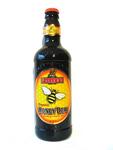
“sweet, golden and refreshing. Brewed using only organically produced
ingredients: English malts, and the finest honey gives a mellow, rounded
character which is deliciously balanced with zesty hops.”
Smells slighly of honey and the taste is very slightly bitter. Otherwise, it's
just another pale ale. Contains malted barley.
Fuller Smith & Turner, London, England. 5.0% alcohol.
[ Posté le 3 mars 2007 à 19:04 |
pas de
commentaire |
lien permanent ]
Catégories : [ Cuisine ]
La recette d'hummus trouvée sur
le web. Je l'ai faite plusieurs fois, sans tahini (parce j'aime pas trop ça).
[ Posté le 3 mars 2007 à 10:45 |
pas de
commentaire |
lien permanent ]
Vendredi, 2 mars 2007
Traduction: [ Google | Babelfish ]
Catégories : [ Bière/Belhaven ]

“A rich deep flavour that derives from the greater proportion of malted
barley to hops which characterised Scottish ales of the 19th century.”
The smell reminded me of grape juice and beef broth, the taste is quite sweet and the aftertaste
has again notes of beef broth. Made of malted barley.
Belhaven Brewery Company Ltd., Dunbar, Scotland. 6.5% alcohol.
[ Posté le 2 mars 2007 à 19:46 |
pas de
commentaire |
lien permanent ]
Jeudi, 1er mars 2007
Traduction: [ Google | Babelfish ]
Catégories : [ Bière/Hook Norton ]
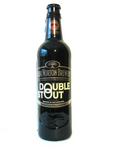
“Black malt enriches the colour and teases the palate with an unmiskable
‘toast’
flavour. Brown malt gives it the dryness. An excellent accompaniment
to red meat.”
Smells of a fruit I cannot put a name onto. The taste is bitter, a bit like
coffee, with a sweet finish that reminds me of chocolate. I didn't find the
‘toast’ flavour, though. Made of malted barley.
Hook Norton Brewery, Hook Norton, Oxon, England. 4.8% alcohol.
[ Posté le 1er mars 2007 à 23:52 |
2
commentaires |
lien permanent ]



















